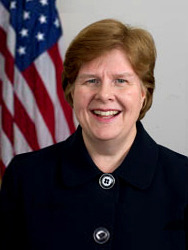Matthew Yglesias's Blog, page 2446
January 19, 2011
Orthodoxy and Brotherhood

Jamelle Bouie about Christian orthodoxy and brotherhood:
At the very least, it's contested. Biblical "literalists" notwithstanding, the Gospels aren't particularly clear on the issue of solidarity. For every John 3:16 or John 3:36, there is a Matthew 25:40 — "The King will reply, 'Truly I tell you, whatever you did for one of the least of these brothers and sisters of mine, you did for me'" — and a parable of the Good Samaritan. Both suggest that belief in Jesus' divinity — or even the God of the Israelites — are ancillary to the question of "Who is my neighbor," or in Bentley's case, "Who is my brother?"
For a little bonus theology/metaethics, here's Ned Resnikoff on how Sam Harris is like "No Labels."


The Wonderful World of Sneaker Tarrifs

Planet Money profiles those civil servants who spend time sawing sneakers apart to determine what level of sales tax should be levied on them:
The U.S. Customs and Border Protection testing facility in Long Beach, Calif. looks like a cross between a university science lab and a theater props department. It's full of long work benches, people in white lab coats, and piles and piles of shoes, shirts and fabric.
The people who work here have a serious mission: to catch importers who are trying to game the tariff laws.
Every product that comes into the U.S. is subject to tariffs, taxes that importers pay to bring certain products into the country. How much tax or duty each importer has to pay is determined by the Harmonized Tariff Schedule, a very big book that classifies products in extremely fine detail. Canvas sneakers with rubber or plastic soles, for example, are assessed a duty of 37.5 percent, but if the sneakers are made of leather, the duty goes down closer to 10 percent.
To repeat what I was saying yesterday, I bow to no one in my left-wing egalitarian convictions. I think taking tax revenue that could be handed to poor people and spending it on this instead is a waste. I think sales taxes on clothing are highly regressive. I know that the tariff system is not only complicated, but specifically engineered to tax luxury items at lower rates. And I agree with Karl Marx that the growth of factory job opportunities in formerly peasant societies is an enormous force for human progress.
I think there are a lot of people who don't necessarily disagree with those points, but who find it somehow unseemly for progressives to point it out. After all, that's the dread free market neoliberalism. There may be some things that the right-wingers are correct about, but it should be their job to do the heavy-lifting. The real left focuses its energy on highlighting the flaws with the market. But there's something achingly naive about expecting the right to enact the sound free market ideas that would be beneficial to poor people. Since when does the right care about poor people? Since when does the right care about ideological consistency? If egalitarians want to advance egalitarian ends, then we need to advance egalitarian ends on all possible fronts, not try to divvy things up and expect Paul Ryan to reduce sneaker taxes for us.


January 18, 2011
Endgame
This is why:
— Why you can't leave higher ed up to the states.
— "There's no such thing as matter of right" development in DC's Buzzard Point. Coincidentally, it's totally desolate!
— Darrell Issa loves public sector waste when it benefits for-profit firms.
— Darrell Issa also seems to be involved a lot of scams.
— Obama administration follows up anti-regulation op-ed with new hospital visitation regulations.
Off their new album, it's "This Is Why We Fight" from the Decemberists.


Christina Romer's Clever Op-Ed

When I heard that Christina Romer had published a column arguing that Barack Obama should make "a comprehensive plan for dealing with the long-run budget deficit" the centerpiece of his State of the Union address, I was kind of flabbergasted. Surely she knows better than that!
But if you drill down into the details of the column, the more it looks very sly to me. Here are her specific points:
— Don't cut spending in 2011, instead outline "cuts in spending that would go into effect over the next few decades, and that he wants to sign into law in 2011."
— Obama should "vow not just to veto a repeal of the [Affordable Care Act], but to fight to strengthen its cost-containment mechanisms."
— Military spending should "grow much more slowly in the future."
— "At the same time, he should give a ringing endorsement of government investment in infrastructure, research and education, which increases productivity and thus improves both our standard of living and the budget situation over time."
— "[T]he president has to be frank about the need for more tax revenue."
— "Another revenue measure should be a tax on polluting energy."
Overwhelmingly, she's just saying that Barack Obama should double-down on the progressive agenda and define the progressive agenda as the key to deficit control. I'm not sure that's sound political advice, but it's pretty reasonable policy advice. Then note that in the penultimate graph she returns to the point that "With unemployment at 9.4 percent and the economy constrained by lack of demand, it would be heartless and counterproductive to move to fiscal austerity in 2011." And indeed it would.


Beware the Couch
The latest findings, published this week in The Journal of the American College of Cardiology, indicate that the amount of leisure time spent sitting in front of a screen can have such an overwhelming, seemingly irreparable impact on one's health that physical activity doesn't produce much benefit.
The study followed 4,512 middle-aged Scottish men for a little more than four years on average. It found that those who said they spent two or more leisure hours a day sitting in front of a screen were at double the risk of a heart attack or other cardiac event compared with those who watched less. Those who spent four or more hours of recreational time in front of a screen were 50 percent more likely to die of any cause. It didn't matter whether the men were physically active for several hours a week — exercise didn't mitigate the risk associated with the high amount of sedentary screen time.
This is the latest in a spate of recent studies that suggest sitting and watching TV is associated with bad health outcomes irrespective of whether or not it crowds out exercise. I started standing for most of the day at work last year, and (for independent reasons)my resolution for the New Year is to do more book-reading and less TV-watching and web-surfing. But I wonder if sitting and reading on an iPad is actually any better than sitting and watching TV.


What Do You Need To Do To Start a Business in The District of Columbia?

Talking to Lydia DePillis, Nicholas Majett, new head of DC's Department of Consumer and Regulatory Affairs (and since 2006 its deputy director for inspections and compliance) says it's not necessarily clear:
Well, I see myself as a communicator. I'm still an attorney. And as a litigator, I've had to argue before judges and juries. And as deputy director for community service, I would attend hundreds of community meetings, a lot of which were on behalf of Director Argo. I think it's just in how you approach people. What I found is that people just don't know. And because the agency's so complicated, you can't just go to one person and get an answer. In most cases, I know the answer. But you can't walk into DCRA and say 'I want to start a business, what do I do?' In fact, a lot of the time, you have to go to an attorney. So a lot of people get frustrated, thinking they're going to come down here and one person's going to be able to answer all of their questions.
Sometimes I get yelled at, but that didn't bother me, it's part of my job. I'm a civil servant. Some people don't use that term anymore, but it used to be that what be called them. I work for the people. I have to treat them with respect, no matter what, and I have to try to calm them down.
As a recovering rage addict, I don't approve of yelling at people, and certainly you shouldn't yell at DCRA employees over things that are out of their control. But as a policy matter, it strikes me that you should, in fact, be able to walk into DCRA and say "I want to start a business, what do I do?" If the agency is "so complicated" that answering the question is beyond human comprehension, then perhaps it should be simplified. But if the issue is really that "you have to go to an attorney" then it sounds like it is, in fact, possible to get the rules explained by adequately trained personnel.
Whichever the case may be (or, as I suspect, a combination of the two), it seems to me that it would be in the city's interest to make it possible for a would-be entrepreneur to walk into DCRA's office and get an answer to the question. A city's going to need some business regulation, but a city's also going to need some people to start businesses. If there's no way to do this without consulting a lawyer first, that's convenient for local lawyers. It's also convenient for big companies who can easily afford lawyers, and it's also convenient for smaller-time but already-established players who can benefit from insider knowledge and who appreciate the protection from competition. But it's not good for workers who might appreciate more employment opportunities, it's not good for consumers who might like more options and it's not good for the city's tax base.


Robert Bentley's Brothers

New Alabama Governor Robert Bentley explains that he's totally colorblind in his worldview, because the only thing that really matters is your relationship to Jesus:
"There may be some people here today who do not have living within them the Holy Spirit," Bentley said. "But if you have been adopted in God's family like I have, and like you have if you're a Christian and if you're saved, and the Holy Spirit lives within you just like the Holy Spirit lives within me, then you know what that makes? It makes you and me brothers. And it makes you and me brother and sister."
Bentley added, "Now I will have to say that, if we don't have the same daddy, we're not brothers and sisters. So anybody here today who has not accepted Jesus Christ as their savior, I'm telling you, you're not my brother and you're not my sister, and I want to be your brother."
I've seen Bentley taking some heat for this on blogs. And certainly it's an impolitic thing to say. But isn't it very orthodox Protestant Christian doctrine? Back in the day we used to have long-winded debates about whether or not progressive politicians need to talk about religion more, and I've always thought this is a reason to be leery of the idea. The coexistence of multiple robust but mutually incompatible faiths is one of America's great strengths, but I'm not sure it actually withstands a huge amount of theological scrutiny. Everyone is ultimately happier when we let this sleeping dog lie.


What Did They Do With Drugs In Portugal?

Mark Kleiman makes the case that there's less than meets the eye to Portugal's drug decriminalization and it doesn't really tell us much about drug policy options:
Simple drug use rarely leads to incarceration. There's not much evidence that the threat of arrest does much to discourage potential users. "Decrim" laws are generally passed in places where there already wasn't much anti-user enforcement. According to the Cato analysis by Glenn Greenwald purporting to show that Portugal's policy change was a success, Portuguese police made between 1500 and 2500 drug-possession arrests per year in the period before decriminalization. That's out of a population of 10 million. The reported rate of illicit drug use is something over 3%, suggesting that the annual risk of arrest for Portuguese illicit-drug users was something under 1%. Neither the Greenwald report, nor the study by Hughes and Stevens published in the British Medical Journal gives any figures on criminal penalties for users, but Greenwald reports that the annual number of administrative proceedings against users after the new law has been more than twice as great as the number of possession arrests before the law. Has the overall deterrent against drug use gone up, or down? It's hard to say.
Overwhelmingly, drug enforcement is directed at dealers, not users. Decrim doesn't change anti-dealer enforcement at all. It therefore doesn't make drugs cheaper or easier to get. So it doesn't provide much of a test of the effect of legalization on consumption. By the same token, it doesn't reduce the arrest and incarceration of dealers, crime incident to the markets, or crime by users to get money for drugs. (Insofar as consumption goes up, all those things tend to get worse, not better.)
This is a very enlightening analysis from Kleiman, but I'm not sure why it's presented with so much scorn and so little praise for decriminalization of possession. Rarely enforced criminal penalties for drug possession are, on this telling, basically nothing but an invitation to abusive selective enforcement. One might think that despite the lack of practical enforcement, theoretical criminal penalties for possession had some large deterrent effect that improves public health. But the Portugese experience seems to indicate that that's not the case. And, indeed, Kleiman's bottom line is that "I'm for decriminalization, not just of cannabis, but of other drugs as well." So—great!—let's do it.


The Causes of the English Civil War
Reading the Baroque Cycle made me want to know more about the real history of 17th Century England, so I asked for recommendations on the English Civil War and a couple of trusted folks told me I should get Conrad Russell's The Causes of the English Civil War. This is a pretty fantastic work of scholarly argumentation that really makes you feel like you understand the issue it's addressing. Did they really fight a civil war over whether you should kneel when you pray and what kind of windows churches should have? Well, they sort of did, and that is a weird thing to happen, and Russell helps you understand how and why something like that could come to pass.
This is, however, not much of an introductory work. It's clearly an argument pitched at people who are already familiar with the basic timeline of the period, the names of the key figures and groups, etc. I didn't really fit the bill personally. But it turns out to be the case that Wikipedia is a wonderful force multiplier in terms of which books one is able to understand. I needed to repeatedly look up proper names and consult a timeline, but that was actually really easy to do.


Hispanic Intermarriage

Jeb Bush tries to make the case for a pro-immigration, pro-immigrant, pro-Latino posture for conservatives:
His insistence on engagement is not a call for multiculturalism. Quite the opposite: "The beauty of America—one of the things that so separates us [from the rest of the world]—is this ability to take people from disparate backgrounds that buy into the American ideal."
With regard to assimilation, he says, Hispanics have much to be proud of. "Second-generation Hispanics marry non-Hispanics at a higher rate than second-generation Irish or Italians. Second-generation Hispanics' English language capability rates are higher than previous immigrant groups'."
Jon Chait objects to this twice in response to Ezra Klein who defends Bush. I want to recommend Jamelle Bouie who makes excellent points and come down on Ezra's side of the dispute.
Here's Chait's point:
It's clearly the case that Bush is making a pro-immigration argument and that he's refuting some harsh anti-immigrant forces within his party. Ezra seems to leap from that point to the conclusion that Bush is making a perfectly benign argument about immigrants [...] He's defending Latino immigration on the grounds that Latino immigrants intermarry and lose their identity. That's better than opposing Latino immigration on the grounds that those things won't happen. But not quite the same thing as accepting Latino immigrants as full Americans whether or not they marry white people and gradually lose their distinctive culture.
I really think this is wrong. For one thing, Bush was careful to say "non-Hispanics" and not "white people." More generally, the fear that high levels of Latin American immigration will irrevocably alter American culture is I think a legitimate thing to worry about. After all, it's certainly true that neighborhoods full of recent immigrants are quite different from neighborhoods where recent immigrants are sparse so you can see where people might get the idea that either we need to choke off immigration or else America will be transformed into a giant Jackson Heights. What's more, binationalism is a genuinely problematic scenario for democratic countries as witnessed by Belgium's endless problems.
The fact that these kinds of worries are factually ungrounded strikes me as an important point to make. This is particularly true because I think the evidence suggests that cultural worries of this sort are a crucial driver of anti-immigrant sentiment. If the wage impact of immigration was the main worry, you'd expect hostility to Mexican immigration to concentrated among Spanish-speaking recent immigrants and it to be highly correlated with enthusiasm for higher levels of high-skill Asian immigration. Clearly, however, that's not the case. Erecting taboos around these cultural worries is only going to be counterproductive.
At any rate, it's perhaps worth mentioning that Ezra and I are both examples of English-speaking people of partially Latin American ancestry. It seems to me that one of the roots of the problem is precisely that the general public doesn't recognize the Matt Yglesiases of the world in this way. Only highly un-assimilated Spanish-dominant people "present" to the bulk of the country as genuinely Hispanic, leading to the perception that Hispanic immigrants and their descendants are all non-assimilators who don't know English. That's in fact not the case, and people should hear about it.


Matthew Yglesias's Blog
- Matthew Yglesias's profile
- 72 followers



